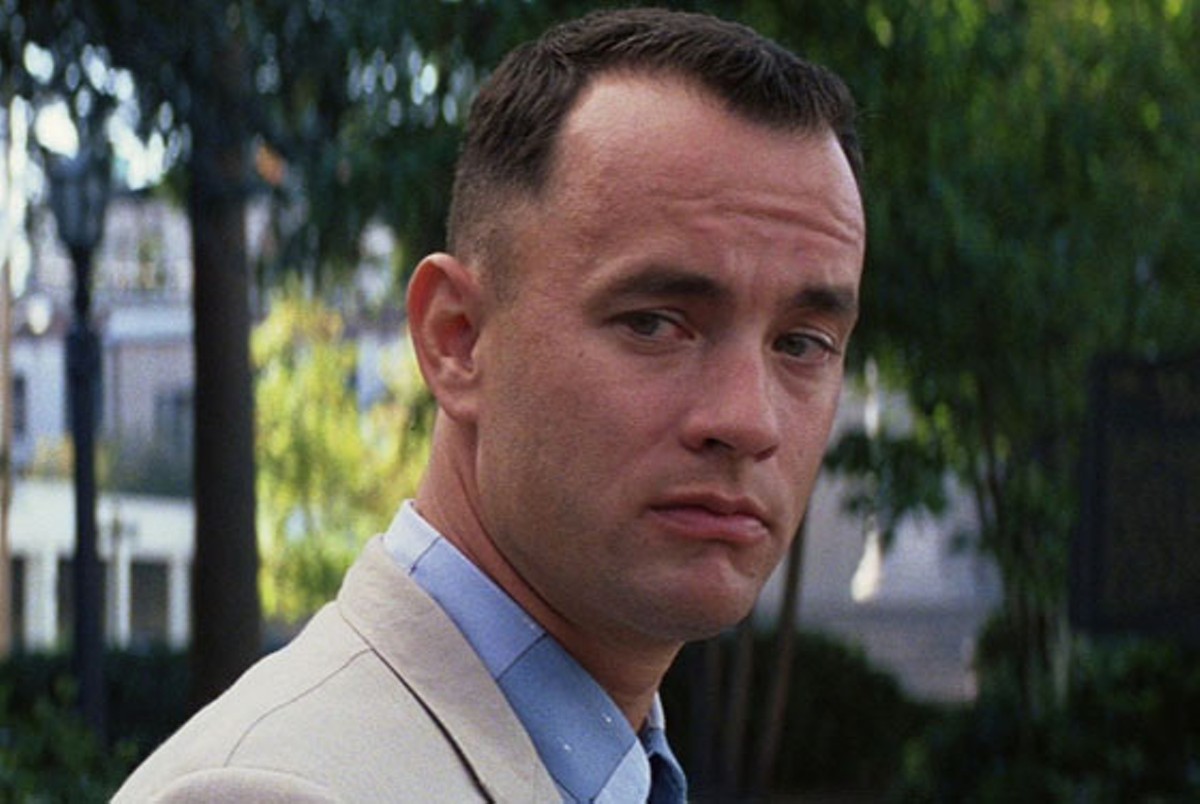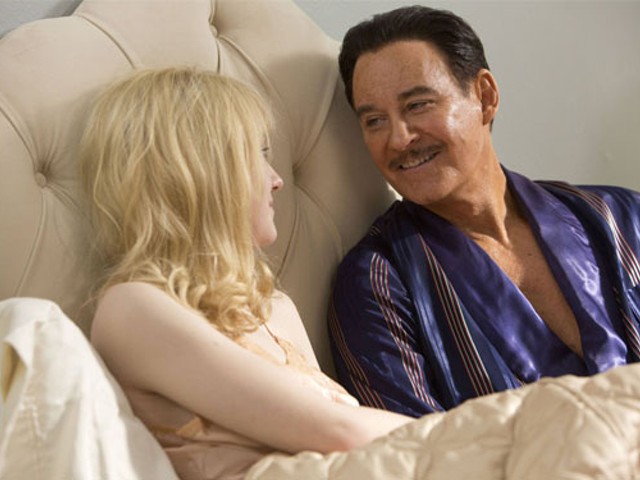Forrest Gump has turned 20 and is celebrating its birthday with a week-long IMAX release. It's a significant milestone for the six-time Academy Award winner. Today, 1994 is as far away from the present as the Vietnam War was from it. Forrest Gump was a fable without a moral, the key to its maddening success. At the end of the movie, the idiot-who-always-failed-up tried to make sense of the story himself. Was his life a tribute to destiny or accidents, he wondered, in a moment of striving depth. Then he shrugged off the question: "Maybe it's both."
But dumb ol' Forrest was right. (Like always.) Both theories boil down to fate, and Forrest Gump may be the most curiously fated film in modern history. This sweet-as-mass-produced-chocolate mega-hit adored by everyone's grandma was based on a novel about a mentally challenged giant who lived with cannibals, blasted off into space, and was great in the sack. And what signifies movie Forrest's success couldn't be more '90s. Instead of tumbling around with Raquel Welch, our sanitized Gump unthinkingly invests in Apple stock.
Original author Winston Groom was staggered. He thought the adaptation should star John Candy, not the boyish and reedlike Tom Hanks, who ran six miles every day during filming. (Groom's Gump preferred to wrestle.) Cheated out of millions by Paramount until he filed a very public lawsuit, Groom wrote a sequel, Gump & Co. "Don't never let nobody make a movie of your life's story," it began, before chugging into a bleak comedy about failing downwards. Forrest loses his fortune, bungles the recipe for New Coke, gets embroiled in Iran-Contra, and wrecks the Exxon Valdez. Shockingly, it was never green-lit.
I'd watch that sequel. I'd also watch the alternative movies you can't help imagining as you re-watch Forrest Gump, ones about his mama or Jenny or Lt. Dan. For every blessing that falls at his feet like a feather from the sky, karma punishes his loved ones, not that he notices. (And the film can't look them in the eye either.) They live complicated, big-screen lives we only glimpse in the margins beyond Forrest's myopia. His jilted mom prostitutes herself to get her boy into a better school. His crush sleeps her way through the era where misogyny cloaked itself in peace and love, all while being stalked with Jason Voorhees relentlessness by her flat-topped childhood playmate. His war buddy drinks to forget his survivor's guilt and screams in anger that while he lost his legs protecting his men, the moron who just winged it won the Congressional Medal of Honor.
Actually, that last movie had already been made by Oliver Stone five years before. With two decades of perspective on Forrest Gump's triumph, you get the sense that '90s audiences were relieved to see a film that said it was okay — even honorable — to ignore all the bad stuff about war. So, too, were the Oscars, who 12 months after lauding Schindler's List decided, "Screw it, let's give the awards to the movie that sells cookbooks."
Forrest doesn't kill anyone. He doesn't get PTSD. He doesn't even have a clue why he's in Vietnam. The film is so afraid to dredge up debate that when Abbie Hoffman hands Forrest the microphone at an anti-war rally, someone unplugs the speakers so we can't hear him — fitting for a movie with nothing to say.
It's understandable that in the Clinton-era Americans were tired of being bludgeoned by the grand truth that war is hell. The older generations knew that too well, and the young had grown up in a time where war didn't seem that bad. Our troops might pop over to Grenada or Panama or Iraq, but we expected them to come home victorious and intact. As Forrest shrugged, these deployments were simply trips to "a whole other country."
Now that we're once again welcoming home traumatized veterans, Forrest Gump's blithe solution that ignorance is bliss rankles. (Even at the time, the military itself refused to support the film, grumbling, "The generalized impression that the Army of the 1960s was staffed by the guileless, or soldiers of minimal intelligence, is neither accurate nor beneficial.")
Yet Forrest Gump has persevered, still celebrating 20 years of ignoring the tragedies that lurk beneath our lives like great whites in the dark waters below his shrimping boat. Let us not forget that the Bubba Gump fortunes only came after a hurricane took out all of Forrest's competition. Post-Katrina and post-recession, even his seafood riches now have a rotten aftertaste.
It's unhip to like Forrest Gump, but the film's $677 million box-office haul makes it impossible to deny that it once struck a chord. It will be interesting to see if its weeklong re-release tanks. The year it came out, George W. Bush was elected governor of Texas. He was arguably Forrest Gump as commander in chief, a cheerfully oblivious 7-minute miler who you could almost imagine would press his muddy, sweaty face to a shirt and leave an imprint of a smiley like a sanguine Shroud of Turin.
Still, not everyone mistook Bush's malapropisms for wisdom while we, the Academy voters, and the film ascribed brilliance to Forrest Gump even when he said nothing at all, like the pack of joggers who join him on his coast-to-coast marathon, panting behind him patiently waiting for their messiah to speak. Finally, he opens his mouth. "I'm pretty tired," he says. "Think I'll go home now." He leaves them lost in the middle of nowhere. Two decades later, it's still not clear if the joke was on them or on us.






